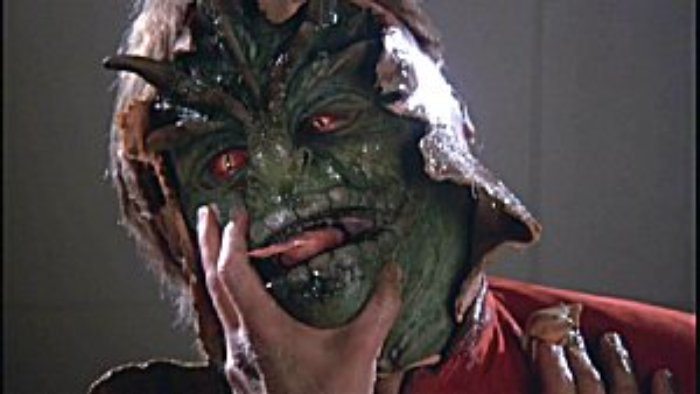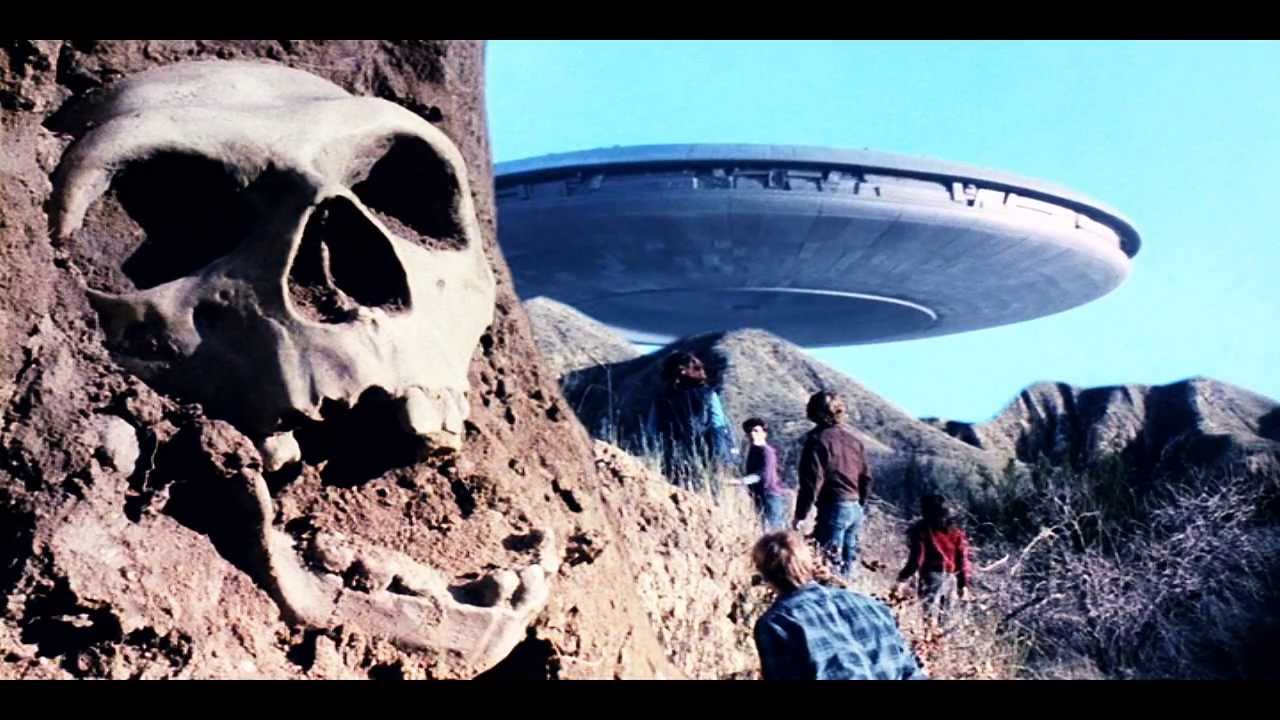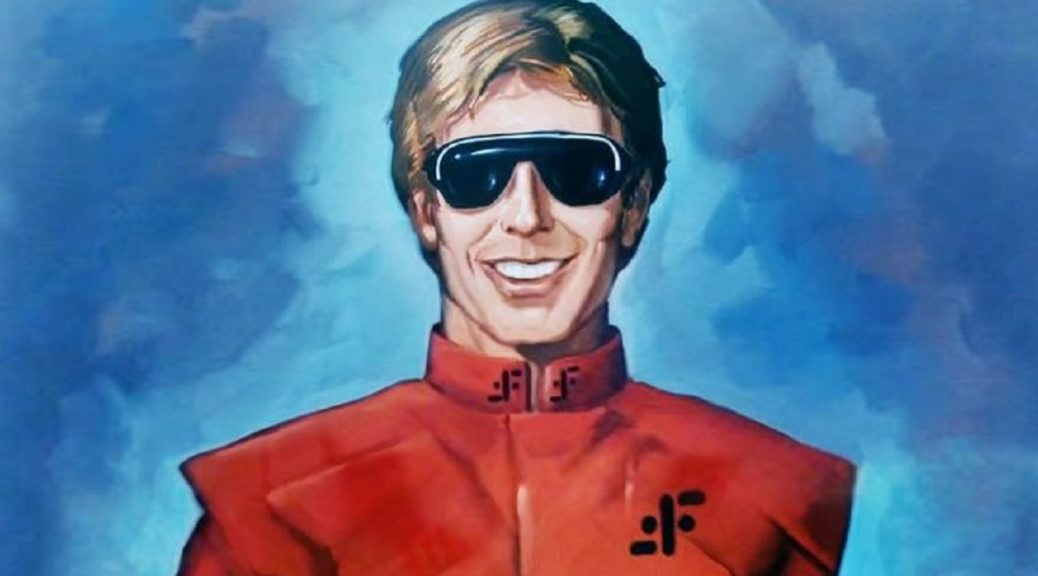A SERIES THAT STANDS THE TEST OF TIME!
Fifty alien spaceships descended over major cities all over the world and announced that they came in peace and needed humanity’s help. These friendly alien Visitors looked just like us and offered us the fruits of their knowledge in exchange for our assistance in fabricating various chemicals required to save their planet. Or so they said.
V, the mini series, turned 35 years old this year, and it seems like it is more relevant today than ever. People often mistake V as an alien invasion story; but the aliens didn’t invade — they occupied. Great science fiction is stories that allow us to look at ourselves and remind us of how we need to be better. V told us the dangers of fascism. An allegory for the Nazi uprising and their subsequent occupation of Europe, V was a story about everyday people rising up against tyranny.
Kenneth Johnson’s original concept for V was called Storm Warnings, and there were no aliens; it was about a fascist political party rising to power in America. NBC executives then recommended he rework his script into a science fiction story to capitalise off of the resurgence of the genre that had begun in the late 1970s with Star Wars. The executives also felt that audiences would find it hard to believe that a fascist party could rise to such a degree of power in the United States. The core concept of the story remained the same — a fascist power taking over the world — and the allegorical nature of the mini series remained. Making it a science fiction story allowed them to really lean into the idea of fascists rising to power in not only the United States but the entire world.

The title V was chosen because of the mysterious nature of it. The question of what it stood for was one of the things that drew in audiences, most of them thinking it stood for visitor until the reveal at the end of the first part that it actually stood for victory. This mystery extended to the marketing which was, in my opinion, genius and one of the earliest uses of viral marketing. It involved putting up the propaganda posters that the Visitors themselves used in the series. A week later, red Vs were spray-painted over the posters like in the series, and a week after that, the posters were replaced with a black poster showcasing the red V and the details of the airdate. It was a truly unique method to market the show and a method that fits in with the mini series perfectly. The Visitors slowly assimilated human society as the marketing similarly coaxed the audience into watching it.
The original script did not have character names but what their professions had been: the gardener, medical student, etc. The characters were intentionally designed to come from all different ethnic backgrounds to give a sense of all of humanity joining together to fight the oppressive aliens. The Visitors themselves were very heavily inspired by the Nazi party, their uniforms and logo were especially reminiscent of the jackbooted Nazi troops. The Friends of the Visitors was based on the Hitler Youth, and scientists took the role of the persecuted. The characters were intricately designed to show the effects an occupation has on the collaborators, the opportunists, the resistors, and the neutral parties.
The reveal of the Visitors true appearance remains as shocking and impressive today as it was when it originally aired 35 years ago. The special makeup effects were incredibly crafted and designed, and, with one or two exceptions, they still hold up today. Some of the model work may look clunky by today’s standards, but the mini series wasn’t a high special effects invasion story with big battles and fight sequences. As I said earlier, this wasn’t an alien invasion story, it was an alien occupation story. The Visitors manipulate their way into power using brainwashing techniques and doctoring evidence of a conspiracy against them. The music was composed by frequent Kenneth Johnson collaborator Joe Harnell and it had a subtle recurring rhythm of the letter V in morse code. The production design is wonderful, most notably the interiors of the Visitors’ ships which look much more realistic than most other Science Fiction productions. There weren’t any walls of randomly blinking lights to be seen.

There are many stand out performances in the mini series. Jane Badler is perfect as the villainous Diana, Robert Englund is quirky and adds a touch of humour with his portrayal of the dim witted Visitor Willie, and Faye Grant is spectacular as the young medical student who finds herself having leadership thrust onto her. The real stand out for me is Leonardo Cimino as the Holocaust survivor Abraham whose impassioned speech to his son about how they have to help their scientist neighbours hide from the Visitors. It’s a wonderful performance that really hits an emotional chord. It would be impossible to comment on the performances of every major character in the mini series because it is so packed with rich characters and performances. Every actor plays their role with a level of sincerity and believability that is tough to get in a large ensemble cast.
The mini series ends with the story far from resolved, although they would resolve the story in the follow up V: The Final Battle, and then needlessly continue it with a weekly series. Neither of the follow ups ever get close to equaling the quality set by the original mini series, and I believe this is because the follow ups were made without the involvement of Kenneth Johnson. He walked away from the follow up due to creative differences with the network and struggled to produce something he could be proud of with the limited budget they set for the sequel. Due to this, Kenneth Johnson actually wrote a novel which was a direct follow up to the original mini series that ignored the sequels. Having read the novel, I hoped that it would eventually be able to get made as a film or new mini series but so far nothing has come of it. The ending especially is the only satisfying end that could have been written.
Kenneth Johnson is actually working on a remake of the original mini series and is working to get funding. It was reported earlier this year that Desilu had stepped up to provide the funding required. However they recently parted ways, as it seemed that they weren’t going to fulfil their side. I think that an updated film version of the mini series would be excellent, especially in the current climate. If nothing else, a remake would hopefully get Warner Bros to release the original mini series on Blu-Ray, as it is desperately needed.
The audio commentary on the DVD set has some really interesting facts about the production, for example, the laser blasts from the Visitor’s weapons cost $1,000 each. It’s no wonder they went over budget on their effects when you see how many of those laser blasts appear on screen. By far the most moving of these facts was that the night after V was screened in South Africa, Anti-Apartheid protesters sprayed red Vs in paint. The parallels to Apartheid and the Nazi Occupation have even found it being screened in history classrooms showing the Nazi rise to power.

The impact V had still resonates today. It was one of the first mature science fiction series on TV that didn’t rely on people in dodgy costumes chasing actors down corridors. Instead, it told a real human story that was a realistic view on how an alien force could take over the world. Everything about the series was designed to be as grounded in reality as possible. The opening sequence in El Salvador is shot as if a real documentary crew were there photographing the events. The Alien vessels look and feel more believable than the USS Enterprise or the Battlestar Galactica of the 1970s ever did. Science fiction, especially television science fiction, owes a lot to V. It brought a cinematic quality to television screens, to the point where they shot the mini series in 1.85:1 on the off chance that it would get a theatrical release overseas. It didn’t happen, but had it been released in cinemas it would not have felt out of place or cheap.
V changed the landscape of science fiction for the better and without it we probably wouldn’t have Babylon 5, The X Files or the modern Battlestar Galactica. V showed you could make a mature science fiction series that didn’t need people in rubber suits terrorizing crews of starships. You could tell a very human story with a level of sincerity that had not been seen on television science fiction. No matter what happened to the series that came after, no matter how campy or cheesy it became, the original mini series still stands the test of time.

Matt is a huge film and TV buff who studied film and moving image production at university. In his spare time he enjoys reading comics and books, the occasional gaming session and writing novels.


Bravo Mr. Lesbians.
There’s no need for that nonsense.
Great article. Some tv science fiction fans can be a bit sniffy about V but it still holds the record as the highest ratings for a tv sci-fi show on US TV which I think may have been topped the following year with the sequel The Final Battle
I think the only reason they get sniffy about V is because of the TV series and to some extent The Final Battle. But the original mini series is just as powerful today as it was back then. I’m glad you enjoyed the article.
I believe V was edited for time and released theatrically overseas (what market?). Kenneth Johnson was fairly satisfied how well V held together after the editing.
It wasn’t. Also when editing the mini series together they actually had to go to NBC and ask for an extra 15 minutes because he couldn’t find a way to cut out anything else. The studio executive looked at the cut and agreed that they needed the extra 15 minutes and gave it to them.
[…] V: The Mini Series 35 Years Later […]
Great article Matt! ILANA from http://www.ilanasVsite.com
Thanks 🙂
The Final Battle still stands the test of time and has a great creepy theme tune. I’ve read the scripts wrote by Ken Johnson’s team and it is great but there are some great lines of dialogue missing from it, like when Diana promises Julie an attitude adjustment!!
Great article about V, Matt! It was a real pleasure to read it. So happy to know V is still kept warm in the hearts of its special fans. I remember when V first aired in America back in May of 1983. It was called “V: The Origin”. That title did not last long. Back in the day, whenever they showed reruns of V on NBC or FOX, (and when it was released on DVD), it was called “V: The Mini Series”. V is very close to my heart and to this day, I try to watch it at least… Read more »
Great article about V, Matt! It was a real pleasure to read it. So happy to know V is still kept warm in the hearts of its special fans. I remember when V first aired in America back in May of 1983. It was called “V: The Origin”. That title did not last long. Back in the day, whenever they showed reruns of V on NBC or FOX, (and when it was released on DVD), it was called “V: The Mini Series”. V is very close to my heart and to this day, I try to watch it at least… Read more »
[…] We interrupt your regularly scheduled Welcome To You Are Doom to discuss V The original Miniseries. If you haven’t heard about the show or have been meaning to check it out, now is the time. We’ve even got an article from Matt up on our site about the show. Enjoy as we wait for our esteemed Graham to return. Here’s the article in question. […]